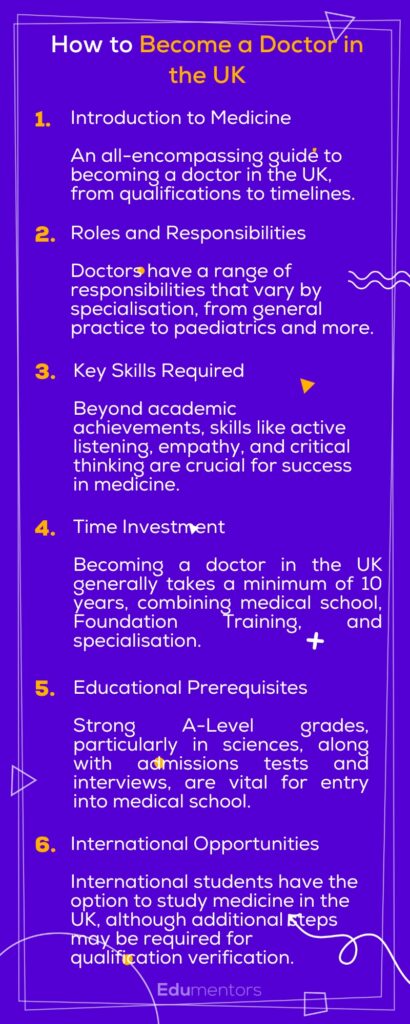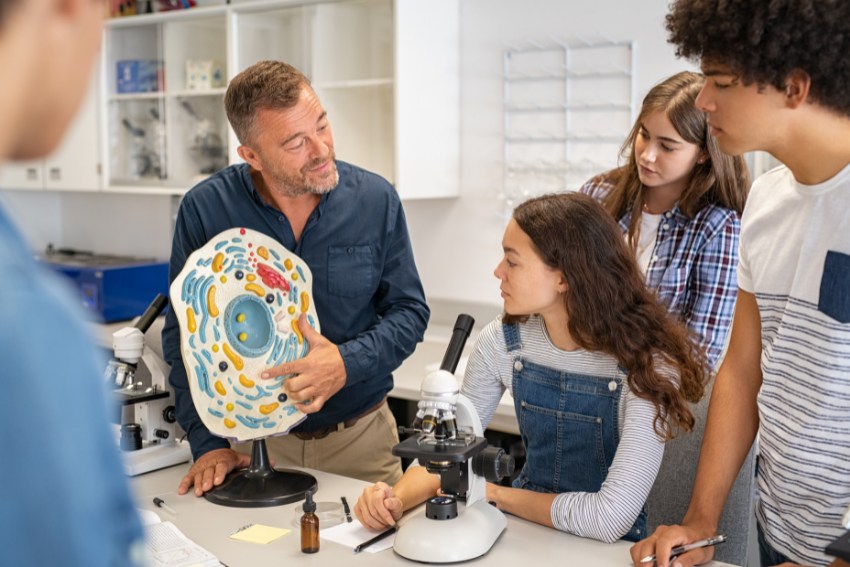How To Become A Doctor in the UK
Welcome to your ultimate guide on becoming a doctor in the United Kingdom. Have you always been captivated by the world of medicine and are now wondering about the specifics of how to become a doctor in the UK? Perhaps you’re globally oriented, seeking guidance on how to become a doctor in various parts of the world. If you’ve been grappling with these questions, rest assured, you’ve landed on the right page. This comprehensive guide aims to demystify the process and lay down the essential steps you must undertake to become a doctor.
In the United Kingdom, the journey to becoming a medical professional is not only rigorous but also exceptionally rewarding. So whether you’re a high school graduate pondering about the qualifications needed, or a career switcher evaluating the pathways available, we’ve got you covered. From educational requirements to the types of specialisations, from the length of training to career prospects—this guide serves as your all-encompassing resource for navigating the medical landscape in the UK.
If you are committed to taking up the noble and challenging profession of medicine and are determined to become a doctor, then read on. We’ll equip you with all the knowledge you’ll need to set out on your path in one of the most rewarding and respected careers in the world.

What Qualifications Do you Need to be a Doctor in the UK?
The vocation of a medical doctor is an intricate tapestry of roles and responsibilities that go far beyond just diagnosing and treating ailments. From a general practice physician to specialists in fields like paediatrics, oncology, and psychiatry, the medical profession is as diverse as it is challenging.
General Practice Physician – The Jack-of-all-Trades
General practice physicians, often the first line of medical care, serve as the backbone of the healthcare system. These doctors are skilled in a broad spectrum of medicine and can treat patients of all ages. Typically, they handle acute and chronic illnesses, provide preventive care, and health education to patients. They are highly trained in diagnosis, and their expertise often leads to early detection of conditions that require specialised medical attention. From diagnosing a common cold to identifying the symptoms of a more serious condition, the role of a general practice physician is pivotal in directing patients to the most suitable specialist for their needs.
Specialisation in Medicine – The Experts
Specialising in a particular medical field involves years of rigorous training and research, enabling doctors to become experts in their chosen area of study. The range of specialisations is vast, and the depth of knowledge required is profound. Let’s explore some popular specialisations:
Paediatrics – Doctors for the Young
In the field of paediatrics, doctors are trained to manage the health of your child, including physical, emotional, and social well-being. From minor health issues to serious diseases, paediatricians have the experience to treat a broad range of problems. The paediatrician’s role is ongoing and involves long-term monitoring of children’s developmental milestones, behavioural patterns, and overall well-being. Some even further specialise into paediatric cardiology, neonatology, or paediatric oncology, to name a few.
Oncology – Warriors Against Cancer
Oncologists work at the forefront of battling cancer, one of the leading causes of death globally. There are several sub-specialties within oncology, including medical, surgical, and radiation oncology. Each plays a different but complementary role in cancer care. Oncologists are deeply involved in research and often collaborate with a team of healthcare providers to offer multidisciplinary treatment options. Their role involves not only the medical treatment of cancer but also providing emotional and psychological support to patients and their families.
Psychiatry – Mind Over Matter
Psychiatrists deal with the prevention, diagnosis, and treatment of mental, emotional, and behavioural disorders. A psychiatrist is trained to differentiate mental health problems from underlying physical conditions and is also trained to prescribe medication. The field has multiple sub-specialities, including addiction psychiatry, forensic psychiatry, and geriatric psychiatry. They often work in tandem with psychologists, social workers, and a broad range of mental health professionals to provide holistic care.
Whether you aim to be a general practice physician or plan to venture into a specific specialisation in medicine, each role offers its own set of challenges and opportunities. By understanding these paths, you can make an informed decision about which direction best aligns with your skills and interests.
How to Be a Doctor in the UK?
Embarking on a medical career is no small feat; it demands a unique blend of skills and qualities that go beyond academic prowess. While medical training equips you with the knowledge to diagnose and treat illnesses, there are inherent traits and soft skills that are crucial for becoming a successful doctor. Let’s delve into some of these key attributes:
Communication Skills – The Bedrock of Patient Care
One of the cornerstones of effective medical practice is impeccable communication skills. A doctor’s ability to communicate clearly and effectively with patients, their families, and other healthcare professionals can significantly impact patient outcomes. From explaining complex medical jargon in a way that’s easily digestible, to ensuring that the patient’s treatment plan is well-understood, communication is a skill that should not be underestimated. Good communication also fosters trust, which is essential in the doctor-patient relationship.
Active Listening – More than Just Hearing
Active listening is a subset of communication skills but warrants its own spotlight due to its importance. The ability to attentively listen to patients not only aids in accurate diagnosis but also makes the patient feel heard and respected. Listening isn’t just about hearing what is being said but also picking up on what isn’t—like unspoken worries or underlying emotional distress. It’s about asking the right questions and providing appropriate responses. In medical consultations, where every minute counts, active listening can make a world of difference.
Empathy – A Dose of Human Touch
Empathy—the ability to understand and share the feelings of another—is invaluable in the medical field. Whether you’re delivering good news or discussing a challenging diagnosis, showing empathy can make these moments more comforting for patients. Being empathetic helps to build a rapport with patients and enhances their overall healthcare experience. It’s often the compassionate approach, combined with medical expertise, that leaves a lasting impact on patients.
Critical Thinking – Decision-making Under Pressure
In a profession where decisions can be a matter of life and death, critical thinking is an essential skill. Doctors often find themselves in high-stress situations where they have to make quick yet informed decisions. This requires the ability to assess problems from multiple angles, weigh the pros and cons, and come to a conclusive solution. Critical thinking is especially vital in diagnosis, treatment planning, and when confronted with medical anomalies that don’t fit the textbook criteria.
In essence, mastering these skills and embodying these qualities are not optional but rather essential elements in the making of a proficient doctor. While some of these attributes are innate, others can be cultivated with time and experience. Regardless, they are fundamental to medical practice and can significantly impact your effectiveness and success in your medical career.

How Many Years Does it Take to Become a Doctor in the UK?
If you’re considering a career in medicine, it’s essential to know the time investment required to reach your professional goals. The journey to becoming a fully-qualified doctor in the UK involves multiple stages, each with its own duration and set of challenges. So, how long does it take to become a doctor? Let’s break it down:
1. Medical School
One of the most common questions aspiring medics ask is, How long is medical school in the UK? The answer is approximately five to six years, depending on the university and course structure. Some medical schools offer a foundation year for students who don’t have the necessary A-Level subjects, which adds an extra year to the training.
During this period, students undertake a blend of academic learning and clinical experience. The early years focus on theoretical knowledge, such as anatomy, physiology, and biochemistry, while the later years are primarily dedicated to clinical rotations in various medical specialties.
2. Foundation Training
After graduating with a medical degree, the next phase is the Foundation Training, often referred to as the F1 and F2 years. This two-year programme provides junior doctors with general training across multiple disciplines, allowing them to rotate through areas like general medicine, surgery, and emergency care. By the end of Foundation Training, you will have completed a minimum of seven years of medical education and training.
3. Specialisation
Post Foundation Training, doctors then proceed to specialty training, which can vary greatly in duration. For example, General Practice training typically takes three years, while surgical or medical specialisations like cardiology or neurology can require up to eight years of additional training.
So, if we’re discussing “how many years does it take to become a doctor in the UK?,” the answer could range from a minimum of 10 years to as much as 16 years or more, depending on your chosen specialisation.
Becoming a Doctor is a Lifetime Commitment!
The path to becoming a doctor is a lengthy one, requiring a significant commitment of time and effort. Therefore, when asking how long to become a doctor?, it’s crucial to factor in the years of continuous learning and professional development that follow formal training. Medicine is an ever-evolving field, and keeping up-to-date with the latest medical research and techniques is a lifelong pursuit. This ongoing education increasingly includes developing digital skills as healthcare becomes more technology-driven, with electronic health records, AI diagnostic tools, and telemedicine becoming standard practice.

Educational Requirements – Essentials Before Medical Degree
Embarking on a medical career in the UK is a demanding journey that starts long before you step into medical school. So, what qualifications do you need to be a doctor in the UK? The requirements are stringent, and prospective students must meet specific educational criteria from their school years to even qualify for a medical degree programme. Here’s a breakdown of the various educational stages:
1. GCSEs
GCSEs are the first significant educational hurdle for aspiring doctors. Although universities may not specify the exact GCSE subjects you should take, they usually look for strong grades in the sciences and Maths. A majority of candidates will have at least 6-8 GCSEs at grades A*-C or 9-4 in the new grading system, with a particular emphasis on science subjects like Biology, Chemistry, and Physics.
2. A-Levels
After GCSEs, the next academic milestone is A-Levels. When contemplating what subjects are needed to become a doctor, the focus here is undoubtedly on the sciences. Most medical schools require Chemistry and Biology at A-Level, and some may also require or prefer Maths or Physics, similar to A Level requirements for dentistry, another competitive healthcare field. Grades are crucial at this stage, with most universities asking for a minimum of AAA.
3. Admissions Tests
Before securing a place in a medical school, you will typically have to pass an admissions test. The UKCAT (UK Clinical Aptitude Test) and BMAT (Biomedical Admissions Test) are two of the most widely recognised tests. These assessments evaluate skills like problem-solving, critical thinking, and data analysis and can be stringent barriers to entry. It’s advisable to prepare thoroughly, as your scores are crucial in the selection process.
4. Interviews
Some universities also require prospective medical students to undergo interviews as part of the admissions process. The interviews often include both traditional questions and Multiple Mini Interviews (MMIs), designed to evaluate your communication skills, ethical reasoning, and overall suitability for a medical career.
Given the difficulty of GCSEs and A-Levels, many students opt for private tutoring to enhance their chances of excelling in these vital exams. The importance of online tutoring is growing significantly, especially with platforms like Edumentors providing tailored, one-to-one tutoring. What sets Edumentors apart is that their tutors come from top UK universities, ensuring you’re getting high-quality guidance tailored to the rigours of the British educational system.
Types of Medical Degrees and Doctor Training Pathways
Navigating the labyrinth of medical degrees and training pathways can feel overwhelming, but understanding the key distinctions is crucial for aspiring doctors. Different titles and routes can affect the duration and nature of your medical education, as well as your future career prospects. So, let’s break down the different types of medical degrees and doctor training pathways you may encounter in the UK.
Medical Degrees
While studying medicine, you’ll earn a degree that often comes in one of several acronyms: MBBS, MBChB, MB BChir, or simply MB. Confusing, isn’t it? In essence, they are equivalent qualifications but are named differently depending on the university. For instance, MBBS (Bachelor of Medicine, Bachelor of Surgery) is awarded by institutions like King’s College London, while MBChB (Medicinae Baccalaureus, Baccalaureus Chirurgiae) is more common in universities such as the University of Manchester. These degrees pave the way for your medical licensure and further doctor training in the UK.
Foundation Programme
Once you’ve got your medical degree, the next step in the doctor training pathway in the UK is the Foundation Programme. This two-year training involves rotations across multiple medical and surgical specialities, offering a well-rounded clinical experience. It is the standard entry route into either General Practice or Specialty Training, and it gives you a chance to experience a range of medical disciplines before you commit to a long-term career path.
GP Training
General Practice (GP) training typically follows the Foundation Programme and lasts three years. It incorporates both hospital placements and community-based settings, offering exposure to a broad range of clinical conditions. After completion, you’ll be equipped to take on a role as a GP, serving as a first point of contact for healthcare in the community.
Specialty Training
For those aspiring to become specialists, Specialty Training is the next hurdle. The duration of this training can vary widely, from three to eight years, depending on the speciality. Whether you’re interested in cardiology, neurology, or any of the numerous sub-disciplines, the training will be rigorous and highly specialised. The goal is to make you an expert in your chosen field, and it culminates in a Consultant position within the NHS or private practice.

Become a Doctor – Options for International and Alternative Paths
In a world that’s becoming increasingly interconnected, the medical profession is no exception. Whether you’re an international student keen on studying medicine in the UK or a UK resident exploring medicine abroad in Europe, the array of options has never been more expansive. In this section, we’ll delve into the opportunities and alternative routes that are available to you.
Studying Medicine in the UK
For international students, the allure of studying medicine in the UK often stems from the high calibre of education, excellent healthcare system, and opportunities for research. However, gaining admission into a UK medical school can be highly competitive. Requirements may include strong academic qualifications, English language proficiency exams, and even additional admissions tests depending on the institution. Tuition fees also tend to be higher for non-UK/EU students, but scholarships and financial aid are sometimes available to offset these costs.
Alternative Routes into Medicine in the UK
While the traditional pathway involves a straight-run from A-Levels to a medical degree, there are alternative routes available. Graduate Entry Medicine (GEM) is an accelerated four-year medical programme designed for those who already have a degree in a different field. Likewise, Access to Medicine courses can provide another entry route for those without traditional qualifications, although these are often aimed at mature students.
Medicine Abroad in Europe
For those contemplating international experiences, several European countries offer medical degrees taught in English. Countries like Germany, Poland, and the Czech Republic have gained popularity for their lower tuition fees and different educational approaches. However, it’s essential to consider the implications on your career if you intend to return to the UK; your qualifications will need to be verified, and you might require additional training to align with UK standards.
The Road to the UK
If you’ve studied medicine abroad, the road to practising in the UK involves some crucial steps. Firstly, you’ll need to get your qualifications verified through the General Medical Council (GMC). This ensures that your education is recognised and up to par with UK standards. After this, you may be required to complete a Foundation Programme or directly enter into a training pathway, depending on your prior experience and qualifications.
Conclusion
Your journey towards becoming a doctor will be a rigorous yet fulfilling one. Each step, from obtaining the right qualifications to completing your specialised training, will prepare you for a life committed to healing and helping others. We hope that this guide has shed light on the multifaceted process of becoming a doctor in the UK. As you stand on the threshold of this noble profession, take that next crucial step with knowledge, confidence, and a deep sense of purpose.
FAQs
How Long Does it Take to Become a Doctor?
The length of time it takes to become a doctor varies based on your educational pathway and chosen speciality. Generally, a medical degree in the UK takes five or six years, followed by two years of Foundation Training and then additional years for specialisation.
What Qualifications Do You Need to Be a Doctor?
To enter a medical school in the UK, you typically need strong A-Level grades, especially in the sciences. You’ll also need to pass admissions tests like the UCAT or BMAT and potentially go through interviews.
Is Studying Medicine in the UK Different from Other Countries?
Yes, the UK has specific requirements and offers certain types of training programmes that may differ from other countries. The education is highly regulated to maintain the calibre of healthcare professionals.
What Are the Various Types of Medical Degrees Available?
In the UK, the most common types of medical degrees are MBBS and MBChB, both of which are undergraduate courses. Some universities also offer graduate entry courses (GEM).
Can I Study Medicine Abroad and Practice in the UK?
Yes, you can study medicine abroad and practice in the UK, but you’ll need to get your qualifications verified by the General Medical Council (GMC) and may need to complete additional training.
Is a Career in Medicine Financially Rewarding?
While the costs of studying medicine can be high, particularly for international students, a career as a doctor is generally financially rewarding, offering stability and numerous opportunities for growth.









